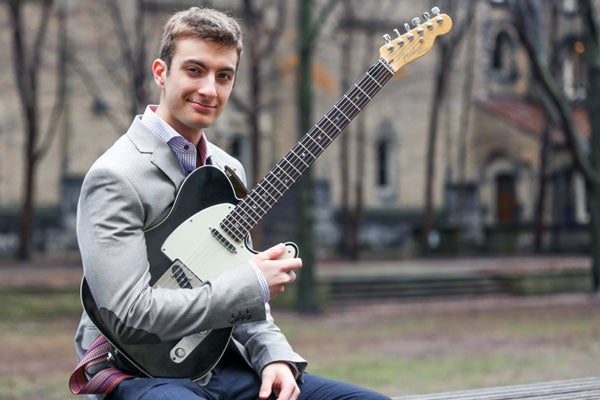
Guitar hero: meet the student awarded the Spectrum New Voices Composer
Published: May 6, 2014
Among the award-winning musicians who honed their craft at University of Toronto’s Faculty of Music are composers Mychael Danna and Owen Pallett. One day we may be able to add music student Nick Lavkulik to this list.
Lavkulik recently debuted his first complete compositional work, Handprints, with the Ton Beau String Quartet at Toronto’s Annex Theatre. (As further proof of the U of T’s reach, all of the string quartet performers including violinists Alexa Wilks, Linnea Thacker, viola player Alex McLeod and cellist Sarah Steeves are Faculty of Music alumni.) The performance also featured renowned pianist Florian Hoefner.
The composition is the result of a residency Lavkulik earned as the first-ever Spectrum New Voices Composer, awarded by the Canadian composers group Spectrum Music. Lavkulik’s residency took the form of an all-day workshop with NYC-based composer Daniel Jamieson – yes, another U of T Faculty of Music grad.
Born and raised in Toronto, Lavkulik has already received international recognition for his work. Two years ago, at age 17, Lavkulik’s modern jazz tune, “B.E.T. on Yorke”, took home a prize at the Downbeat Magazine 2013 Student Awards.
U of T News caught up with him to learn more about his musical plans and the evolution of Handprints which was inspired after Lavkulik saw an image of prehistoric handprint cave art that he felt symbolized the most vulnerable portrayal of self expression.
How did it feel to actually hear the notes come to life by other musicians?
Watching them perform at the concert was possibly the most nerve-wracking experience I've ever had. It was the first time I’d experienced being a composer and not a performer. It was difficult to let it be completely out of my control once they got on stage. The musicians did great despite my piece having unorthodox rhythms and patterns.
What was the biggest challenge in composing “Handprints”?
I struggled a lot with writing for predominantly classical musicians and feeling satisfied with how much my piece related to prehistoric art. A lot of days were spent irrationally wondering “Does this five-note musical idea draw a clear enough picture of a caveman making a handprint on cave walls?” Haha! Initially in my composing process I was trying to create program music but later on I realized I didn't need need to try and be so explicit. Once I started going with an artistic and musical idea I felt comfortable with, it wasn't too much of an issue.
What did you learn from Daniel Jamieson during your residency?
I learned a compositional rule of never having more than three things going on at once. I also learned how important it is to know the range of each instrument really well. For example, knowing where to put a trumpet section to play chords as opposed to lead melody lines in a section really makes a huge difference!
Who are your biggest musical influences?
Some really big albums for me include Radiohead's Kid A, John Mayer's Where the Light Is, Bon Iver’s For Emma Forever Ago, Brad Mehldau's Highway Rider, Donny McCaslin's Perpetual Motion and the Wayne Shorter Quartet's Beyond the Sound Barrier. Some other musicians I greatly admire are Mark Guilianna and Tigran Hamasyan.
Now that you’ve debuted this work, what are your musical plans?
A new musical aspiration I have is to collaborate within different genres other than traditional and modern jazz. This is partly a result from working with the Spectrum musicians. The Spectrum Concert stimulated a completely new musical perspective for me.
What advice would you give to other young composers?
Focus on getting something on the page and then reworking it if you don't like it. Writing a great song on the first draft isn't easy. I improve my pieces the most from revising them, especially after rehearsals. But you also have to learn when to let go, start another piece and accept many of your first pieces won't be very good. I haven't written that many tunes but I think it was different for me especially with my development as an improviser and listener. But everybody's process is different and often changing, experiment with different approaches. If you want to get better at composing, do it a lot.
Listen to some of Lavkulik’s work here: https://soundcloud.com/nicklavk
A sample of Handprints will be posted here in a few weeks' time: http://spectrummusic.ca/



